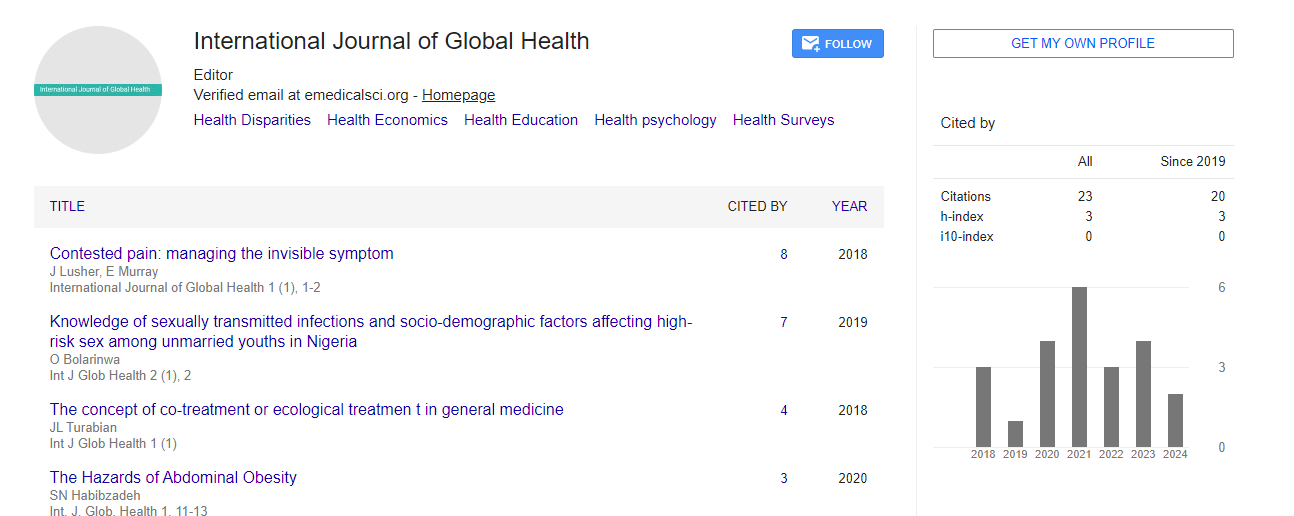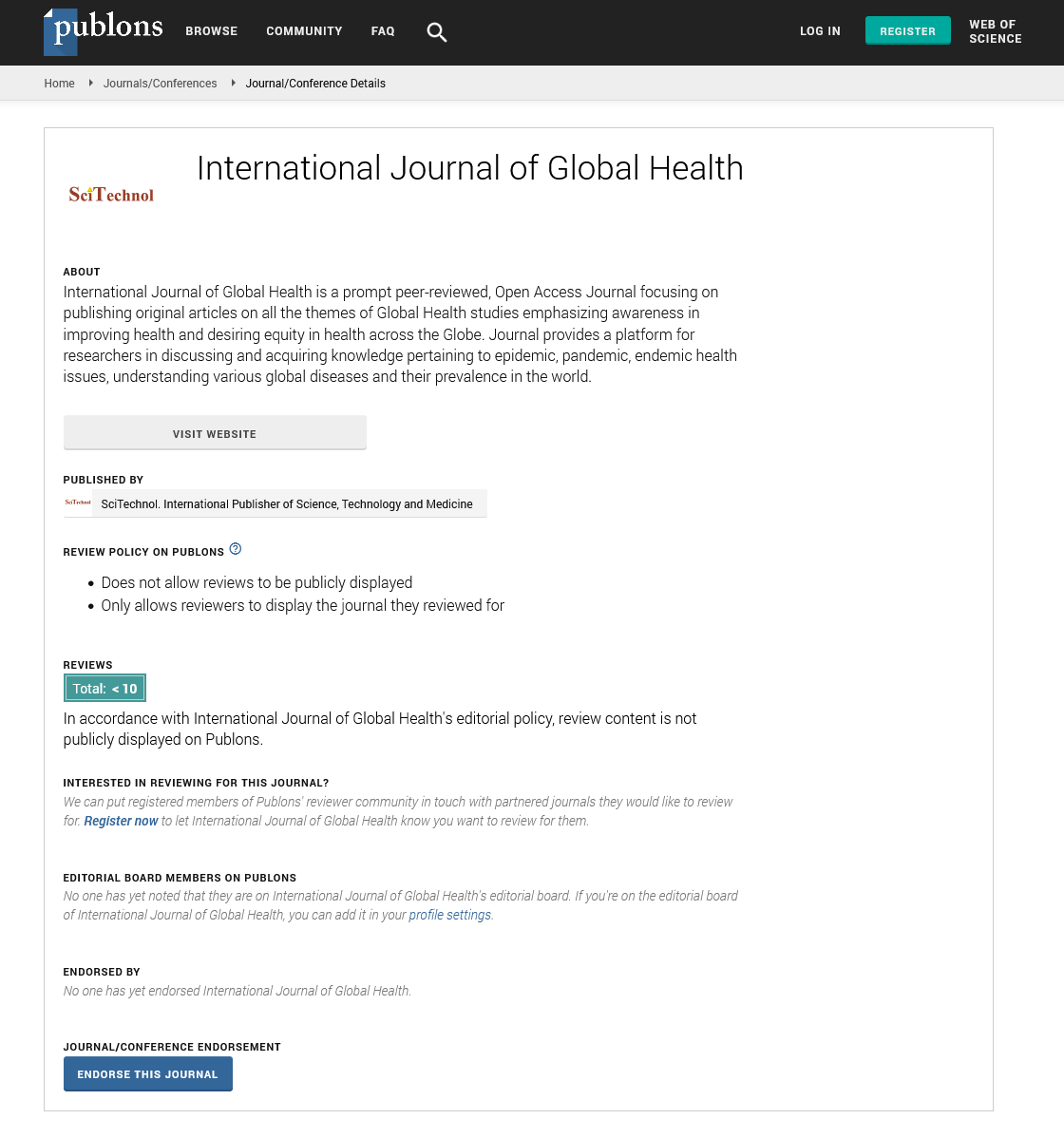Short Communication, Int J Glob Health Vol: 4 Issue: 5
Short Communication on Epidemiological Studies
James Nickson*
Department of Urban Health and Health Care, Imam Abdulrahman Bin Faisal University, Dammam, Saudi Arabia
- *Corresponding Author:
- James Nickson
Department of Urban Health and Health Care, Imam Abdulrahman Bin Faisal University, Dammam, Saudi Arabia
E-mail: nicksonj320@gmail.com
Received Date: August 31, 2021; Accepted Date: September 14, 2021; Published Date: September 21, 2021
Citation: Nickson J (2021) Short Communication on Epidemiological Studies. Int J Glob Health 4:5. 143.
Copyright: © All articles published in International Journal of Global Health are the property of SciTechnol, and is protected by copyright laws. Copyright © 2021, SciTechnol, All Rights Reserved.
Keywords: Global Health; Health Disparities; Health Economics
Short Communication
The study of disease transmission is the investigation of how frequently infections happen in various gatherings of individuals and why. Epidemiological data is utilized to design and assess techniques to forestall ailment and as a manual for the administration of patients in whom sickness has as of now created.
Like the clinical discoveries and pathology, the study of disease transmission of a sickness is an indispensable piece of its fundamental portrayal. The subject has its unique procedures of information assortment and translation, and its vital language for specialized terms. This short book means to give an ABC of the epidemiological methodology, its phrasing, and its techniques. Our lone presumption will be that per users as of now accept that epidemiological inquiries merit replying. This presentation will demonstrate a portion of the unmistakable attributes of the epidemiological methodology [1].
The vital component of logical the study of disease transmission is a correlation bunch. Consider an enormous flare-up of hepatitis A that happened in Pennsylvania in 2003. Investigators observed to be practically the entirety of the case-patients had eaten at a specific eatery during the 2 a month and a half (i.e., the average brooding time frame for hepatitis A) preceding beginning of sickness. While the examiners had the option to limit their theories to the café and had the option to reject the food preparers and workers as the source, they didn’t know which specific food might have been polluted. The examiners asked the case-patients which café food varieties they had eaten, yet that lone showed which food varieties were mainstream. The examiners, in this way, additionally enlisted and met an examination or control bunch a gathering of people who had eaten at the eatery during a similar period however who didn’t become ill. Of 133 things on the eatery’s menu, the most striking distinction between the case and control bunches was in the extent that ate salsa (94% of case-patients ate, contrasted and 39% of controls). Further examination of the fixings in the salsa ensnared green onions as the wellspring of disease. Presently, the Food and Drug Administration gave a warning to the general population about green onions and hazard of hepatitis A. This activity was in direct reaction to the persuading results regarding the insightful the study of disease transmission, which analyzed the openness history of case-patients with that of a proper examination bunch [2-4].
At the point when agents find that people with a specific trademark are more probable than those without the trademark to get an illness, the trademark is supposed to be related with the infection. The trademark might be a:
Segment factor like age, race, or sex;
Protected factor like blood gathering or resistant status;
Conduct or act like smoking or having eaten salsa; or Situation like living almost a harmful material site.
Distinguishing factors related with sickness help wellbeing authorities fittingly target general wellbeing anticipation and control exercises. It likewise directs extra examination into the reasons for sickness [5].
Consequently, insightful the study of disease transmission is worried about the quest for purposes and impacts, or the why and the how. Disease transmission specialists utilize insightful the study of disease transmission to evaluate the relationship among openings and results and to test speculations about causal connections. It has been said that the study of disease transmission without anyone else can never demonstrate that a specific openness caused a specific result. Frequently, be that as it may, the study of disease transmission gives adequate proof to take fitting control and avoidance measures.
Epidemiologic examinations fall into two classes: test and observational
Test contemplates
In a trial study, the agent decides through a controlled interaction the openness for every person (clinical preliminary) or local area (local area preliminary), and afterward tracks the people or networks over the long haul to distinguish the impacts of the openness. For instance, in a clinical preliminary of another immunization, the agent may arbitrarily allot a portion of the members to get the new antibody, while others get a fake treatment shot. The specialist then, at that point tracks all members, sees who gets the illness that the new immunization is planned to forestall, and analyses the two gatherings (new antibody versus fake treatment) to see whether the antibody bunch has a slower pace of infection. Additionally, in a preliminary to forestall beginning of diabetes among high-hazard people, examiners haphazardly allotted enrolees to one of three gatherings - fake treatment, an enemy of diabetes medication, or way of life mediation. Toward the finish of the subsequent period, specialists tracked down the most reduced rate of diabetes in the way of life intercession bunch, the following least in the counter diabetic medication bunch, and the most elevated in the fake treatment group [6].
Observational examinations
In an observational examination, the disease transmission specialist essentially notices the openness and illness status of each investigation member. John Snow’s investigations of cholera in London were observational examinations. The two most normal kinds of observational examinations are partner studies and case-control considers; a third sort is cross-sectional investigations.
References
- Porta M (2014) A Dictionary of Epidemiology (6th ed.). New York: Oxford University Press. ISBN 9780199976737. Retrieved 16 July 2014.
- Nutter Jr FW (1999) “Understanding the interrelationships between botanical, human, and veterinary epidemiology: the Ys and Rs of it all”. Ecosyst Health 5: 131-140.
- Hippocrates (~200 BC). Airs, Waters, Places.
- Carol B, Alvaro L, Enrique N, Milton T (1988) The Challenge of Epidemiology: Issues and Selected Readings. Pan American Health Organization. Washington, DC. p. 3.
- Alfredo M (2004). A history of epidemiologic methods and concepts. ISBN 978-3-7643-6818-0.
- Historical Developments in Epidemiology. Chapter 2. Jones & Bartlett Learning LLC.
 Spanish
Spanish  Chinese
Chinese  Russian
Russian  German
German  French
French  Japanese
Japanese  Portuguese
Portuguese  Hindi
Hindi 
